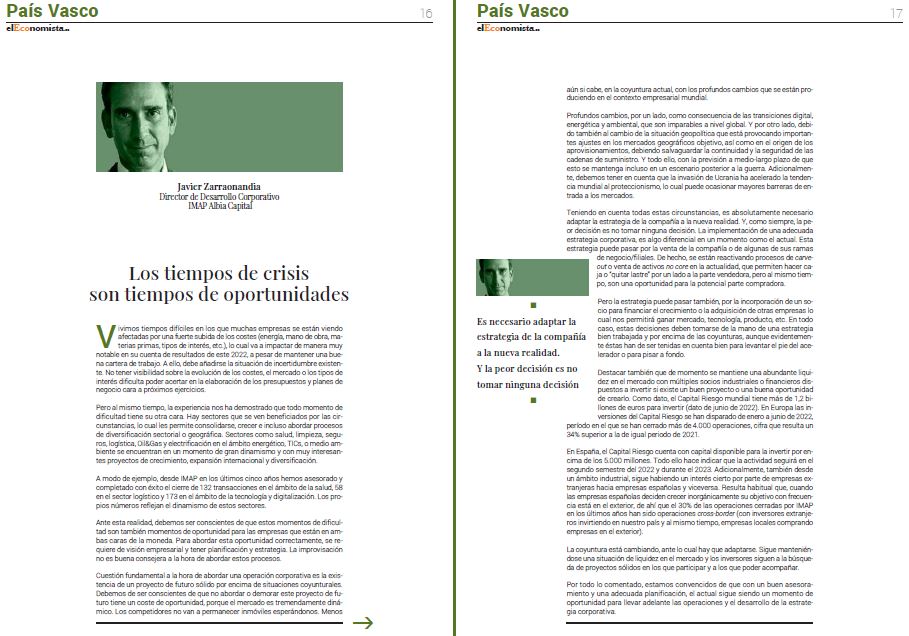These are difficult times, in which many companies are being affected by sharp increases in costs (energy, labour, commodities, interest rates, etc.), and this will have a notable impact on their income statements in 2022 despite their healthy portfolios.
Add to this the prevailing uncertainty. Having no way of knowing how costs, markets or interest rates are going to evolve makes it difficult to prepare accurate budgets and business plans for the coming years.
But at the same time, experience has shown us that there is a flip side to every difficult situation. There are always sectors that benefit from the circumstances, which allow them to consolidate, grow and even diversify into different industries or geographical areas. Sectors such as healthcare, cleaning, insurance, logistics, Oil&Gas and electrification in the energy field, ICTs, or the environment are currently experiencing a boom, with many interesting possibilities for growth, international expansion and diversification.
By way of example, in the last five years IMAP has advised and successfully completed 132 deals in the healthcare sector, 58 in the logistics sector and 173 in the field of technology and digitalisation. The numbers themselves reflect the dynamism of these sectors.
Within this context we must bear in mind that times of trouble are also times of opportunity for companies on both sides of the coin. Business vision, planning and strategy are required to take advantage of these opportunities, whilst improvisation is not recommended when dealing with these kinds of processes.
A main issue when approaching a corporate operation is the existence of a solid project for the future, above and beyond the current situation. We must be aware that delaying or refusing to devise a project for the future has an opportunity cost, due to the fact that the market is enormously dynamic. Competitors are not going to stand around waiting for us and even less so in the current environment, with the profound changes that are taking place in the global business context.
These profound changes, on the one hand, are a consequence of the inexorable digital, energy and environmental transitions that are taking place on a global level.
And, on the other hand, they are the result of shifts in the geopolitical situation, which are causing major changes in target geographic markets and supply sources. In this sense, the continuity and security of supply chains must be safeguarded, with the expectation for the medium-to-long term that this situation will continue even in a post-war scenario. It is also important to remember that the invasion of Ukraine has accelerated the global trend towards protectionism, which could lead to greater barriers to market entry.
Taking all these circumstances into account, it is critical for companies to adapt their strategies to the new reality and, as always, the worst decision is no decision at all.
The implementation of an adequate corporate strategy can make all the difference at a time like this. Such strategy may involve the sale of the whole company or some of its lines of business or subsidiaries. In fact, carve-outs or sales of non-core assets, which are experiencing a comeback of late, allow the seller to make cash or “lighten their load” but also pose opportunities for potential buyers.
The strategy can also include taking on a partner to finance growth or acquire other companies in order to gain market, technology, product, etc. In any event, these decisions must be taken hand in hand with a well-thought-out strategy that looks beyond the current state of affairs, although this must obviously be considered when deciding whether to ease up on the accelerator or step on the gas.
It should also be noted that for the time being there is still abundant liquidity in the market, with multiple industrial and financial partners willing to invest in the right project or the right opportunity. In fact, there are over €1.2 trillion in global venture capital available to invest (data from June 2022). In Europe, venture capital investments soared from January to June 2022, a period in which more than 4,000 deals were closed, 34% more than the same period in 2021.
In Spain there is more than €5 trillion in venture capital available for investment. All this suggests that business will continue to be brisk in the second half of 2022 and into 2023.
Additionally, there are still foreign companies in the industrial sector interested in Spanish companies and vice versa. When Spanish companies decide to grow inorganically, they often look beyond our own borders and this is why 30% of the deals closed by IMAP in recent years were cross-border transactions (with foreign investors investing in our country and local investors buying companies outside Spain).
Therefore, the situation is changing and companies need to adapt accordingly. There is still liquidity in the market and investors are still looking for solid projects in which to participate and which they can support.
For all the reasons mentioned, we are convinced that with good advice and proper planning the current situation continues to pose opportunities to move forward with transactions and develop corporate strategy.


